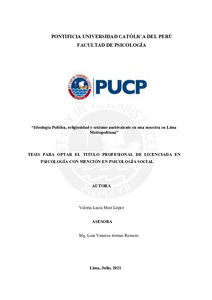| dc.contributor.advisor | Arenas Romero, Lina Vanessa | |
| dc.contributor.author | Mori López, Valeria Lucía | |
| dc.date.accessioned | 2021-08-04T17:52:58Z | |
| dc.date.available | 2021-08-04T17:52:58Z | |
| dc.date.created | 2021 | |
| dc.date.issued | 2021-08-04 | |
| dc.identifier.uri | http://hdl.handle.net/20.500.12404/19825 | |
| dc.description.abstract | La investigación tuvo como objetivo identificar relaciones entre las variables ideología
política, sexismo ambivalente y religiosidad; además de identificar potenciales diferencias
según el sexo de los participantes, y según creencia religiosa. La muestra estuvo
conformada por 161 personas nacidas en Lima, de las cuales fueron 77 hombres y 84
mujeres, entre 18 y 58 años (M = 23.17, DE = 7.71). Se utilizó la Escala de Orientación
hacia la Dominancia Social (Pratto, Sidanius, Stallworth & Malle, 1994), la Escala de
autoritarismo de Ala Derecha (Zakrisson, 2005), el cuestionario de autorreporte de
Sexismo Ambivalente (Glick y Fiske, 1996) y la Escala de religiosidad (I-E 12) (Simkin
y Etchezahar, 2013). Los resultados sugieren una correlación significativa entre las
escalas de SDO con el RWA y el nivel de religiosidad de los participantes. Asimismo, en
relación al primer objetivo específico (encontrar relación entre las variables mencionadas
acorde al sexo), los hombres presentaron puntajes significativamente más altos en las
dimensiones de la variable de sexismo ambivalente (hostil y benevolente), así como en
las escalas de RWA (autoritarismo de ala derecha) y SDO (orientación hacia la
dominancia social), en comparación a las mujeres. Se discute cómo un menor puntaje
percibido por las mujeres puede explicarse a través de cambios culturales de los últimos
años. De la misma manera, en relación al segundo objetivo específico (encontrar
diferencias en las variables mencionadas acorde a si es creyente religioso o no), las
personas creyentes religiosas presentan mayor puntaje que los no creyentes en
religiosidad, autoritarismo de ala derecha (RWA), sexismo benevolente, sexismo hostil,
orientación extrínseca personal, orientación extrínseca social y orientación intrínseca. | es_ES |
| dc.description.abstract | The objective of the research was to identify relationships between the variables political
ideology, ambivalent sexism and religiosity; in addition to identifying potential
differences according to the sex of the participants, and according to religious belief. The
sample consisted of 161 people born in Lima, of which 77 men and 84 women, between
18 and 58 years old (M = 23.17, SD = 7.71). The Orientation towards Social Dominance
Scale (Pratto, Sidanius, Stallworth & Malle, 1994), the Right Wing Authoritarianism
Scale (Zakrisson, 2005), the Ambivalent Sexism self-report questionnaire (Glick and
Fiske, 1996) and the Scale of religiosity (IE - 12) (Simkin and Etchezahar, 2013). The
results suggest a significant correlation between the SDO scales with the RWA and the
level of religiosity of the participants. Likewise, in relation to the first specific objective
(finding a relationship between the mentioned variables according to sex), men presented
significantly higher scores in the dimensions of the ambivalent sexism variable (hostile
and benevolent), as well as in the RWA scales (right wing authoritarianism) and SDO
(social dominance orientation), compared to women. It is discussed how a lower score
perceived by women can be explained through cultural changes in recent years. In the
same way, in relation to the second specific objective (find differences in the mentioned
variables according to whether they are a religious believer or not), religious believers
present higher scores than non-believers in religiosity, right-wing authoritarianism
(RWA), benevolent sexism, hostile sexism, personal extrinsic orientation, social extrinsic
orientation, and intrinsic orientation. | es_ES |
| dc.language.iso | spa | es_ES |
| dc.publisher | Pontificia Universidad Católica del Perú | es_ES |
| dc.rights | info:eu-repo/semantics/openAccess | es_ES |
| dc.rights.uri | http://creativecommons.org/licenses/by/2.5/pe/ | * |
| dc.subject | Religiosidad--Aspectos psicológicos | es_ES |
| dc.subject | Sexismo | es_ES |
| dc.subject | Ideología política--Aspectos psicológicos | es_ES |
| dc.title | Ideología Política, religiosidad y sexismo ambivalente en una muestra en Lima Metropolitana | es_ES |
| dc.type | info:eu-repo/semantics/bachelorThesis | es_ES |
| thesis.degree.name | Licenciado en Psicología con mención en Psicología Social | es_ES |
| thesis.degree.level | Título Profesional | es_ES |
| thesis.degree.grantor | Pontificia Universidad Católica del Perú. Facultad de Psicología | es_ES |
| thesis.degree.discipline | Psicología con mención en Psicología Social | es_ES |
| renati.advisor.dni | 42520290 | |
| renati.advisor.orcid | https://orcid.org/0000-0002-4341-6343 | es_ES |
| renati.author.dni | 74297543 | |
| renati.discipline | 313066 | es_ES |
| renati.juror | Espinosa Pezzia, Agustín | es_ES |
| renati.juror | Arenas Romero, Lina Vanessa | es_ES |
| renati.juror | Rodríguez Espartal, Noelia | es_ES |
| renati.level | https://purl.org/pe-repo/renati/level#tituloProfesional | es_ES |
| renati.type | http://purl.org/pe-repo/renati/type#tesis | es_ES |
| dc.publisher.country | PE | es_ES |
| dc.subject.ocde | http://purl.org/pe-repo/ocde/ford#5.01.00 | es_ES |






